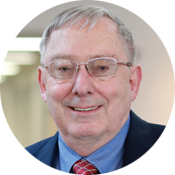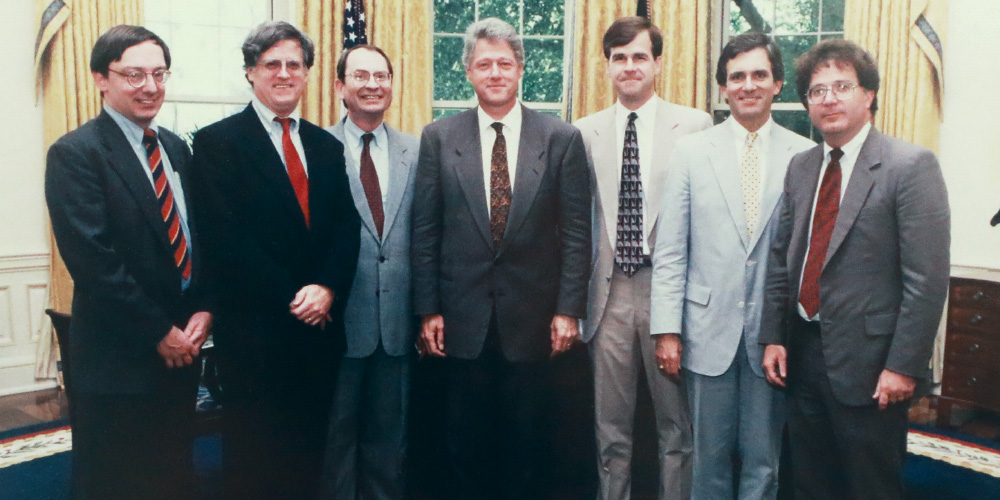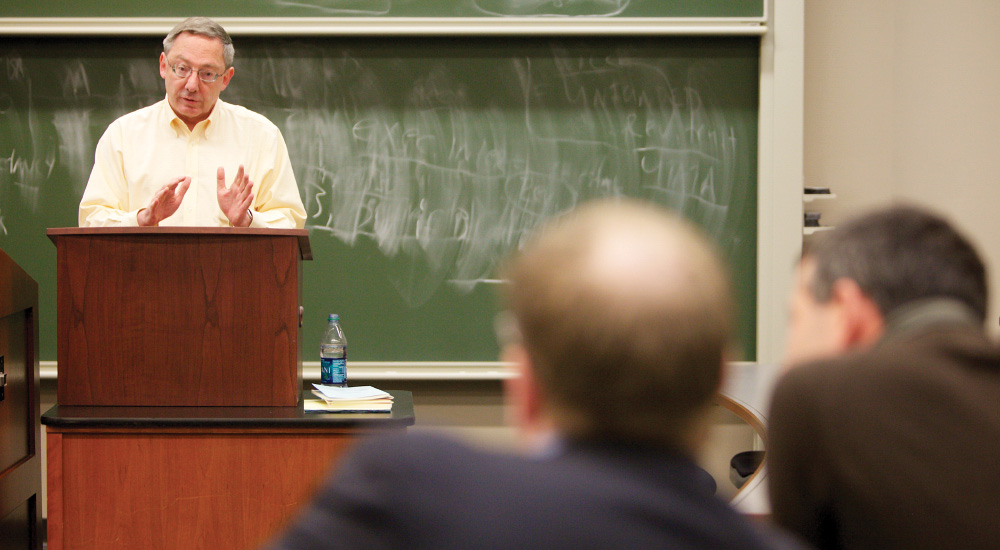Douglas Laycock doesn’t remember all the events surrounding his public high school’s 1963 Christmas assembly. Half a century of appellate litigation, writing and teaching will do that. But he does clearly remember hearing the Christian Nativity story from the Gospel of Luke. And he remembers walking out in protest.
Laycock, who retires from the University of Virginia School of Law in May as perhaps the nation’s preeminent expert on religious liberty — and one of its most effective advocates — said an outspoken atheist he was sitting next to helped him take the plunge.

“He said something like, ‘Let’s just leave,’ and I went with him,” Laycock recalled.
The Supreme Court’s big school prayer cases, Engel v. Vitale in 1962 and Abington School District v. Schempp in 1963 had just come down. Those and other Warren Court cases, along with Perry Mason’s television courtroom dramatics, left an impression on Laycock, who had grown up in Wood River, Illinois, a blue-collar oil refinery town. His father, who had contracted malaria after fighting at Guadalcanal in World War II, loaded petroleum products on barges on the Mississippi River.
“It was naive, but I thought I was going to argue cases in the Supreme Court and save the world,” Laycock said. “Well, 40 years later I did argue cases in the Supreme Court. I certainly didn’t save the world.”
Laycock’s briefs, oral arguments and frequent congressional testimony on behalf of religious groups have helped reinvigorate the free exercise clause and helped lay the groundwork for four federal statutes protecting religious liberty.
At times he has been the target of both the left and right in the culture wars, and he has represented both sides in court. At the Supreme Court, he represented the Catholic Archbishop of San Antonio and, in another case, Texas parents and students who objected to prayer at high school football games. His work — and a letter of support he co-authored — built support for the bipartisan Respect for Marriage Act, which codified federal protections for same-sex and interracial marriages while protecting the right of religious organizations not to participate in those weddings.
“I could just as well have been a gay-rights lawyer as a religious liberty lawyer,” Laycock mused. “I got pulled into the religious liberty space serendipitously, and of course the gay-rights space was well occupied.”
Still, he wrote amicus briefs supporting both same-sex marriage and religious liberty in the two Supreme Court cases that recognized the rights of married same-sex couples, Obergefell v. Hodges and U.S. v. Windsor. When the Masterpiece Cakeshop case was before the court, John Dao ’19, a student who was active in the LGBT student group Lambda Law Alliance, invited him to address Lambda and the American Constitution Society, to allay the student groups’ concerns about the decision’s potential to hurt the gay rights movement.
Laycock will head off to retirement in Austin, Texas, where his sons and his granddaughter live. He retires as the author of a five-volume collection of his writings on the law of religious liberty, lead counsel in six Supreme Court cases and the author of 35 amicus briefs filed there, and the leading expert on the law of remedies. He literally wrote the book on remedies, too, authoring “Modern American Remedies: Cases and Materials” — a widely used law school textbook that reorganized the way remedies are taught — and “The Death of the Irreparable Injury Rule.” He is currently working as a reporter on the American Law Institute’s “Restatement (Third) of Torts: Remedies.”
Laycock accomplished all this in the role of the “trailing spouse,” following his accomplished wife, Teresa A. Sullivan, as she climbed the ranks of higher education. Ultimately, she served as the eighth president of the University of Virginia.
His dad once told him he couldn’t “keep following that girl around,” and a rural Illinois cousin once tried to “console” him after he left private practice so he and Sullivan could teach at the University of Chicago. “He said, ‘It’s OK, Abe Lincoln failed, too,’” Laycock said with a chuckle. “But following that girl around has worked out pretty well.”
He and “that girl” have been “very happily married” for 52 years this June, he said.
Shifting Sands on Religious Liberty
Many of Laycock’s current and former law students from his time on the faculty at the universities of Chicago, Texas, Michigan and Virginia are in awe of his accomplishments.
“He’s a giant in not one, but two fields — a leading scholar of both remedies and religious liberty,” said Joel Johnson ’15, who went on to clerk at the Second Circuit and now teaches criminal procedure and torts at Pepperdine Caruso School of Law after working as an appellate litigator in private practice.
 President Bill Clinton joined a White House meeting on how the administration should interpret or enforce the Religious Freedom Restoration Act. Pictured are Laycock, Ed Gaffney from Valparaiso University, Mike Whitehead from the Southern Baptist Convention, Clinton, Steve McFarland from the Christian Legal Society, Brent Walker from the Baptist Joint Committee on Religious Liberty, and Michael McConnell, then at Chicago, now at Stanford. McConnell was one of Laycock’s first students.
President Bill Clinton joined a White House meeting on how the administration should interpret or enforce the Religious Freedom Restoration Act. Pictured are Laycock, Ed Gaffney from Valparaiso University, Mike Whitehead from the Southern Baptist Convention, Clinton, Steve McFarland from the Christian Legal Society, Brent Walker from the Baptist Joint Committee on Religious Liberty, and Michael McConnell, then at Chicago, now at Stanford. McConnell was one of Laycock’s first students.
Laycock’s lectures had a “peek-behind-the-curtain feel to them,” Johnson said. “In a Constitutional Law course I took, he had litigated several of the First Amendment cases we read and he spoke about the cases and the justices the way a Supreme Court litigator might talk with a client.”
Yet, Laycock is self-effacing about his career and the impact of his scholarship and advocacy, despite his Supreme Court wins and scholarly impact. He won his first Supreme Court oral argument 9-0, in Church of the Lukumi Babalu Aye v. City of Hialeah, a case challenging a set of Miami-area ordinances that prohibited animal sacrifice.
A leading religious liberty lawyer had asked him to argue that case at the 11th Circuit U.S. Court of Appeals because the No. 2 person on his staff was a strong supporter of animal rights.
“Of the six cases where I’ve been the lead lawyer for the party, I got some on the merits, but I got others because somebody else got cold feet or had a colleague on the opposite side, or somebody didn’t have any appellate experience and called a lawyer who happened to have just met me,” Laycock said. “The world is a funny place.”
When he lost the animal sacrifice case in the court of appeals, other lawyers in the field urged him not to take it to the Supreme Court, because they feared the grotesque facts made it unwinnable and would create bad precedent.
He shared this skeptical background chorus with his students, including Dao, a former research assistant who had been invited to dinner at the Laycock/Sullivan home and was tickled by the tales from Lukumi and other cases.
“He’s one of the reasons I have a lot of fond memories at UVA,” Dao said. “I was able to interact with him inside and outside the classroom.”
To Laycock, the animal sacrifice ban was an open-and-shut case.
“If anything violates the free exercise clause, this did — you could kill an animal in Florida for pretty much any reason you can imagine, but you could not sacrifice it to a god,” Laycock explained. “The ordinances had been very carefully drafted, so they affected absolutely nobody in the universe except my clients and their [Santería] religion.”
Laycock remembers the moment Justice Anthony Kennedy posed a hypothetical asking whether the church would still violate the anti-sacrifice ordinances if it used a perfectly legal slaughterhouse’s equipment to kill their sacrificial animals. Hialeah’s attorney conceded that it would. Laycock’s co-counsel passed him a note: “We just won,” it said.
That was 1993. Until that decision, the Supreme Court had seemed intent on paring back the religious liberty protections in the free exercise clause, particularly after Justice Antonin Scalia penned a 1990 majority opinion, in Employment Division v. Smith, holding that the Constitution does not allow a person to rely on a religious reason to disobey a neutral and generally applicable law.
Laycock would go on to litigate five more cases at the Supreme Court. Johnson, his student, remembers his professor’s second-to-last case, Town of Greece v. Galloway, because Laycock had to cancel class to make it to oral argument.
 Laycock participates in a mooting session in preparation for Town of Greece v. Galloway.
Laycock participates in a mooting session in preparation for Town of Greece v. Galloway.
“He was so nonchalant about it, too,” Johnson said. “He informed us of the reason for the cancellation in the same tone one might use to announce a dentist appointment.”
Laycock’s own interpretation of the Smith decision was that, in crafting laws of general applicability, religious groups should be treated as though they enjoy a “most-favored-nation” clause — the law can’t restrict a religious practice if it allows anyone else to engage in the same or an analogous activity for secular reasons. That highly protective interpretation made him a strong advocate for religious individuals and groups. He was also the first to bring widespread attention to the idea that religious organizations have a right to autonomy in the management of their internal affairs and governance. Many academics rejected these ideas as inconsistent with Smith, but eventually, the Supreme Court adopted both of them.
Although Laycock would not win every case he argued, over the arc of his career the Supreme Court has bent toward an increasingly robust embrace of religion in public life. The guy who walked out of his high school’s Christmas assembly is not entirely happy about that.
“The court has taken that most-favored-nation idea and they’re just running it into the ground, so ‘free exercise’ has gone from the brink of repeal to actually being over-enforced these days,” Laycock said. “In some of the COVID cases, they were analogizing churches to things that weren’t analogous at all — things that posed much less danger of spreading the virus than a worship service does.”
But the establishment clause is going the other direction, Laycock said. “They’re not enforcing it at all anymore. You can have Christian prayers at government meetings and a 40-foot cross in the middle of the biggest intersection in town and they just rationalize it all as somehow secular,” he said. “Short of passing a law requiring people to go to church, it’s not clear the court would consider anything a violation of the establishment clause.”
Remedying a Misconception
In the field of remedies, in writing “The Death of the Irreparable Injury Rule” in 1991, Laycock was the first to recognize that judges had essentially abandoned the longstanding equitable rule against injunctions when money damages would provide an adequate remedy.
In 1911, the Supreme Court of West Virginia said that “the world is full of horses. If a man threatens to take away or kill his neighbor’s horse, a court of equity will not interfere by injunction, because the owner may recover the value of that horse and buy another.”
Laycock said that this “tort now, pay later” rule never made any sense, and that no court with a choice would actually stand by and let the horse be killed.
His extensive research for the book showed that the irreparable injury rule does not stand in the way of injunctions, and that judges deny injunctions to successful plaintiffs only when the injunction is unworkable or excessively burdensome.
Dan Dobbs, the author of the leading treatise on remedies, said he was “reminded of Cardozo, of Chafee, and even of Maitland in the power Laycock seemed to have over the ideas and in the sweep of materials he was able to bring to bear,” referring to famous legal scholars in a quote published on the book’s cover.
“A lot of academics have been persuaded by what I found, but it’s had zero impact on judges,” Laycock said. “They keep doing what they’ve been doing for 200 years, which is to recite the rule but then grant the injunction anyway. Or recite the rule when they deny the injunction for some completely different reason that has nothing to do with the so-called rule.”
Now, as one of the reporters for the ALI’s update of the restatement on remedies, he’s writing the first draft of the sections on injunctions. “So we’re going to put [my findings] in there and that will have a lot more visibility — we’ll see if it has any impact.”
Perhaps it’s his blue-collar upbringing, but Laycock is loathe to claim that his life’s work has had a definable impact, even in the religious liberty arena.
“Occasionally you can tell from the court’s opinion that you had some impact, but very often the result was predetermined before you ever got there,” Laycock said. “I think in Lukumi, I probably made a real difference because I got them to look at that case in a different way.”
In other cases — some won, some lost — there were no movable votes, he said. “And it’s the same thing in Congress. You can make rational arguments to them and sometimes they matter, but ideological commitments and donors and pressure from constituents matter so much more.”
Rather, Laycock chooses to take pride from the fact that his work was generally unpaid and an act of pure nonpartisan civil libertarianism. He is most proud that he has always defended gay rights and religious liberty, that he worked to enforce the establishment clause and the free exercise clause.
“I’ve always been willing to defend the liberty of people I deeply disagree with,” he said.
Founded in 1819, the University of Virginia School of Law is the second-oldest continuously operating law school in the nation. Consistently ranked among the top law schools, Virginia is a world-renowned training ground for distinguished lawyers and public servants, instilling in them a commitment to leadership, integrity and community service.


